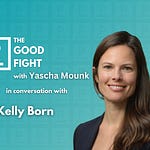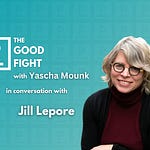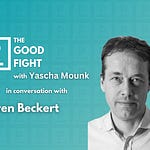Thanks for reading! The best way to make sure that you don’t miss any of these conversations is to subscribe to The Good Fight on your favorite podcast app.
If you are already a paying subscriber to this Substack or Persuasion, this will give you ad-free access to the full conversation with Anastasia, plus the exciting bonus episodes we have in the works! If you aren’t, you can set up the free, limited version of the feed—or, better still, support the podcast by becoming a subscriber today!
Anastasia Berg is an Assistant Professor of Philosophy at the University of California, Irvine and an editor of The Point magazine. Berg is the co-author, with Rachel Wiseman, of What Are Children For? On Ambivalence and Choice.
In this week’s conversation, Yascha Mounk and Anastasia Berg discuss why many couples delay having children and the affirmative case for valuing human life; the moral and ethical implications of the decline in global fertility; and whether a world with fewer humans will be morally worse.
This transcript has been condensed and lightly edited for clarity.
Yascha Mounk: In your book, you try to puzzle through the question of children and you think about it as a question of choice and ambivalence. The fact of having children transforms your life so much that it's very hard to know in what terms even to think about it.
For those listeners who may be approaching the decision about whether or not to have kids, how should they try and think about making this seemingly impossible choice?
Anastasia Berg: Well, the book's origin is in our sense, mine and my co-writer Rachel Wiseman’s, that we don't necessarily have the right conceptual and ethical tools right now to navigate that question. And in fact, there are a lot of assumptions, norms, arguments and paradigms that make that question that much harder to navigate. So the first thing I think somebody needs to do is probably undergo a little bit of what we sometimes call “philosophical therapy,” which is to look through the kind of things that are at the root of their hesitation and uncertainty and see if they can work through them.
The approach we take in the book is, first of all, trying to identify what are the things that trap people in ambivalence. And those include the material financial concerns. They include romantic concerns—the difficulty that people experience finding that “willing and suitable” partner to start a family with. And they also include ethical concerns, whether those are the kind of feminist concerns of how to incorporate motherhood with the ambitions of a woman that hopes to be in control of her life and her body, and the kind of universal humanistic ethical concerns of climate change—I think that moment has passed a little bit, but for a moment it was all about climate change.
Mounk: Perhaps what's distinctly modern is the need to make a choice at all, in the sense that for much of human history, the assumption was that of course you would want to have children. You expected to have children.
How do we make sense of the fact that we are among the first generations of humans who are making the choice in a meaningful way?
Berg: That's a great question. One of the ways in which the transformation that you're alluding to has been described is by saying that we used to have an opt-out culture and now we have to have an opt-in culture. So we have to actively choose to have children where in the past the active choice would have been to not have them. I think that gets at something important, but I think there's also a way of hearing that as saying that people used to just be completely unthinking about this, they were herd-like, they just did it, it's what everyone did. And it kind of casts that past choice as less sophisticated, less intellectually and ethically robust. I think this can miss something important, which is there's a way I think that a culture and a society can embody a value or a way of thinking that might not come up explicitly in the kind of things they'll be writing books about.
So the way we like to put it is by saying that the radical transformation around children has to do with the role of children in human life along the following lines: It used to be that having children was part and parcel for most people what it meant to be a human being. People understood themselves intergenerationally. Anthropologists and historical sociologists will tell you people thought of their kinship relationships as something that constitutes their very identity and they thought of themselves as essentially as having a past and having a future and as part of what it means to live a fulfilling life, to take a direct part in ushering that future. The real transformation is we're thinking about it through opportunity cost analysis at all. And there I agree with you. Once we start applying that framework to the question of children, now we start thinking of children as one more project among many that we have to deliberate on. I agree with you, it's no surprise that we have people increasingly finding themselves without children.
There is also a big humanistic universal question at stake here, which is the question of the value of human life in the present and in the future. And so as we're seeing a turning away from a way of thinking about what we are and what we're here for that acknowledges the significance of a future. I think we are also seeing this implicit negative judgment on the value of a future for human life, which is a very radical kind of refusal.
Mounk: When I was in graduate school and so on, one of reasons why it was hard for me to imagine having children was not just that I didn't have enough money at the time, but the fear that I might have to take jobs I don't want to take in order to sustain those children in the future. Perhaps having children is going to be what keeps you from fulfilling your professional ambitions or your creative ambitions because you're going to have to maximize or at least prioritize making a certain amount of money in order to be able to pay for the upbringing of those kids.
What does it mean to introspect about that in a philosophical manner? How can philosophy help me here?
Berg: I think saying that philosophy can help you directly is probably a little bit misleading as to the methodology of the book. Because the first thing that we did was try to understand what it is really that people mean when they talk about those financial concerns. And I agree with you that for many people today in the US and across the world, there's a question of whether or not they can afford diapers. But we found when we talked to the kind of secular middle and upper middle class people who were showing up in demographic surveys as having a “financial concern” about having children, once we interrogated, we found that across various areas of their lives where the finances and professional success are just one, the other ones being the kind of profound personal psychological development questions.
Millennials and Gen Zers are holding themselves up to very high standards of what it would mean to be ready to have a family. And those standards are so high and so indeterminate that one can easily go through life without ever having reached a point where they could say they have confidently reached them. Some people would say they need a million dollars in the bank in order to have children, or people who grew up quite affluent would say they owe it to their children to maintain the same level of wellbeing that they experienced, or higher. And if they cannot guarantee that (which is very different from the ability to afford the diapers) then they aren’t willing to take on this risk.
What was interesting about this is that we often hear a narrative about millennials, in particular, as being immature, as dithering about adulthood, refusing to grow up; and in fact, there's a way of seeing what I've just described as almost holding themselves up to too high a standard of maturity. It's like they're so concerned with what it means to really be ready that they're postponing the question for as long as they can. And so what we see is a mechanism of what we call a “self-evident logic of postponement.” It seems obvious that the time to have children is as late as possible, something that of course means something different for men and women.
It also means spending your 20s on journeys of self-discovery, right? You don't want to have a child until you figure out “who you are.” And same thing romantically: We see a process we call “slow love” where people are postponing every milestone of a relationship, waiting for a kind of sense of utmost certainty, of almost inevitability, to the children emerging from that bond. They want all of those things to align. I think that a lot of our readers have recognized themselves in this story. And they’re holding themselves to a standard they can barely even name.
Mounk: There seems to me to be something either incoherent or insincere about the views that those respondents give you. Which is to say that if you think that bringing a child into a loving home and a stable situation, but you're not able to give each of the children their own room, or you're not able to send them to the same private school you went to and so on—if you assume that somehow means that that child would rather not exist, that just really doesn't seem like a realistic view of the world. And so I wonder whether the explanation for this is really fundamentally about the preferences of prospective parents, right? Or it really is based on what to me seems like a misapprehension about the value of life, which is to say that we don’t really value the coming into existence of a future life unless that life is perfect.
Help us puzzle through both what the role of potential future children is and how to make sense of why so many people seem to be thinking, “If I can't maintain this very high upper middle class living standard for my children, it's unfair to them. So I'd rather they didn't exist at all.”
Berg: There are so many things in what you just said to unpack. I want to start with something even more basic, which is that I think the question of whether or not I should have a child is so vexed and so fraught that the task of explaining it, of making intelligible my own uncertainty, my own ambivalence to other people is a very difficult one. And so before we sort of start parsing how sincere any kind of objection is, we really need to acknowledge that people are trying to make intelligible a very difficult and confusing state that they're in. And that's why I think you see in different contexts people reach for different kinds of explanations. Something we haven't mentioned is that there's a dimension to that act of explaining our choices that isn't just about personally kind of casting myself in a moral or altruistic light, it's also this hope that perhaps by making my choice intelligible in one way or not another, I might make a kind of difference. I might make my own uncertainty count. Maybe in a way I can't quite make my choice count yet. And what I mean is that we see people in different contexts raise different kinds of moral and political concerns as the quote unquote reason for them to worry about having children.
Finances: in the context of the lack of a social welfare state where we don't have proper parental rights, we don't have universal health care, we don't have child care provided for free or free education everywhere that's of high quality. That's one. Another one we saw a lot before Dobbs, but definitely in the wake of Dobbs, is people who say, “I don't know if I want to have children because of the threat to reproductive rights in the US.” And, of course, people say, “I'm not going to have children because of climate change.” What's interesting is that in places where those particular threats are not in place–for instance, in the Nordic context where seemingly every kind of material obstacle that is named in a context like the US or the UK to having children has been lifted—people are not having more kids. In places where reproductive rights are secured, people are not having more children.
The big aim for us is not to raise the birth rates and it's not to get people to have more kids, or to have kids when they're planning not to have them—it's to get to a state where they feel they're making the choices and the choices are not made for them. Because we're getting alienated by these difficult questions. As you said, this question is also coded as reactionary or conservative, and people who are liberal and progressive may not even want to think about it. What happens is that I end up having a major life choice decided for me by this dithering, or by me being so alienated that I'm not even pursuing it.
Now, about the question you're asking, first of all, I think actually a lot of our respondents were quite honest and they did not necessarily put their choice in terms of a question of the good of the child. They didn't necessarily think they're big altruists. They were saying things like, “I have built a life. I like my job. I like my life. I like my social life. I like to wake up late in the morning. I am not willing to give up these things.” If we want to address that, one of the reasons we have to take seriously into consideration is that in those circles we're talking about (the secular, the center, and left of center circles), we don't have a framework from which we can affirm the goodness of having children as a project. We don't have a framework from which we can affirm the goodness of a human future. It's something that we are very much ginger about. We need to be able to do that if we're helping people to take those hits to their lifestyles. Before they're even trying to protect those kids from harm, they are really saying, “Why would I take this huge hit to my own life and to my own accomplishments?”
Mounk: One of the interesting things in many countries is that when you look at surveys of how many children people want, and then you look at the results of how many children people actually have, they want more children than they end up having. I’m trying to understand why that is. Perhaps it’s something like the question of “Would I like a Ferrari?” I mean, sure, I'd like a Ferrari. But I'm not going to do anything in order to have a Ferrari. I certainly don't want to spend the money it would take to have a Ferrari. So perhaps some of the survey responses we should take with a grain of salt. Perhaps some of that is problems finding the right partner or genuine financial difficulties, with making rent and so on. But some of it, I assume, is the people who for a long time prioritize, understandably, career and aspirations and hobbies and seeking adventure and seeking romantic relationships and all kinds of other things. And by the time that they give the answer that they do want to have children, that they perhaps want to have two or three children, they are unable to have children, or they only manage to have one or two when they wanted to have three or more.
Berg: So I have exactly the same kind of response to those surveys. My example is not the Ferrari, but I recently heard it from Dean Spears at the University of Texas in Austin, and he said it's just like the question “How many times do you want to work out per week?” And I guarantee to you that most people report a big gap between how many times they would like to work out and how many times they've actually worked out. That said, there's another dimension that's important. And I really want to emphasize that people in these moments see the potential here for a kind of, let’s call it a moral political intervention—it's a way of expressing that things didn’t align for them as they should have.
However, I think that gap speaks to something real, and it speaks to the fact that people are feeling a real dissatisfaction with how they think of family and where they are. And I absolutely think a lot of it has precisely to do with this fact that we are spending so much time thinking that time is infinite with this regard, and moreover that the right, mature, responsible (morally, politically, personally, financially, and romantically) thing to do is to wait as long as possible. One of the clearest examples of this is the kind of misinformation that people get about egg freezing. So egg freezing is considered the number one technology that allows you to extend that fertility window for a long time, but very few people we talk to are anything but shocked to learn what the actual success rates of egg freezing are.
We've talked to the women who feel very harmed by this. But I think the other thing that we have to do, beyond addressing the need for people to have the knowledge that they need to make these decisions, I think we should also think about how it is that we make space for an open conversation about the role of children in human life. So another thing we talk about in the book is the kind of anti-humanist tendencies that are feeding into a lot of the attitudes (again, especially on the left). People are looking around them, they see a mess, they say human life is what got us into this mess, sp who needs more of it? And I think we need to make sure that our children and young people growing up today have other resources besides very anti-humanistic climate fiction, for instance, or what's called the ecological literature, as they're trying to think about who are we and why is it that we still deserve a chance at a better future.
Would you (or someone you know) like to read my articles in German or French? Please subscribe to my sister Substacks!
Mounk: You mentioned Dean Spears, who's written very interestingly about this topic. The background of a lot of this is that there's a good number of countries whose basic social model is going to be challenged by the rapidity with which they have a declining population. That is obviously the case in countries in southern and western Europe, when you think of a place like Italy, for example, or countries in East Asia like Japan and South Korea, and China, too, for that matter. And increasingly it's looking like the case even in societies that have historically had higher fertility rates, whether that's France or the United States.
And the concern here is, first of all, that this will make it very hard to sustain pension plans, retirement plans, and other key aspects of a welfare state, because you just have so few working people and having to pay for so many people who are retired. Secondly, it may really undermine economic growth and cultural dynamism and other kinds of positive aspects of our culture. And thirdly, if you think that it would be sad to have fewer people living worthwhile lives, you might think that it's just sad in itself that only 200 million people are going to be able to enjoy what America has to offer, rather than 300 million people, today, or 400 to 500 million people in the future. One interesting finding that Dean Spears and others have argued is that this is not just the case in the most affluent parts of the West. It increasingly is true globally. India, for example, has now fallen below replacement rate. And there's very good reason to think that by the end of the century, we're going to be in a global population decline.
Now, you've also hinted at the fact that the people who so far have written about that have mostly been politically conservative or right-leaning and that we good lefties who care about climate change and other things, should actually be happy about this. Why is that a mistake and why should people avoid letting the kind of brewing culture war around these issues impinge on the personal decisions and how to think about this stuff?
Berg: I think one thing that is interesting is that Dean and people like him are trying to find ways of articulating what's wrong with a declining population that aren't just the kind of material challenges that you're naming. So from the standpoint of our project, I think the first priority is to change our collective attitude towards kind of each person's personal responsibility to contribute to the future (this isn't just about people deciding to have a child, it's also about how do we all orient ourselves around being like the future generation, and that doesn't mean you have to be a biological parent—you could be an adoptive parent, but you can also be a great teacher, a committed journalist, whatever). But how do we get people to change their orientation towards the future? They wager in a way that you can do that by talking about dynamism and progress. And I see the value of that as well, but I have a sense that there's a deeper crisis here that we need to address. And it's a kind of crisis of a capacity to affirm that human existence and human life is good, and one that I would ultimately, as a non-utilitarian, couch in kind of deep ethical terms. And I think we have to address people in those ways and restore a kind of faith on that level.
What's interesting to me is that so much of the difficulty of navigating the choice to have children has to do with the fact that children are not just becoming something we can't affirm, they're also not something that we're seeing as much, at all, because the fewer children people are having, the more people will say, “I have never held a baby, I don't know what a child is.”
So on that personal level, for all the arguments we were talking about, you also want it to be something that is not just throwing yourself off an unknown cliff. And as birth rates decline and as we see fewer and fewer children, I think we're going to see even more uncertainty and ambivalence really take hold, as the people having children are, each and every one of them, going to be making a completely independent choice—you hear this in every friend group from the person who's having children first. They'll name that as one of the challenges: “I was the first to have kids. I didn't have other friends who were parents, and I found that hard to navigate personally and socially.” That's something that I think about a lot, when I think about what that world with declining birth rates is going to look like.
In the rest of this conversation, Yascha and Anastasia discuss the moral case for preferring a world with more humans. This discussion is reserved for paying members…
Listen to this episode with a 7-day free trial
Subscribe to Yascha Mounk to listen to this post and get 7 days of free access to the full post archives.













